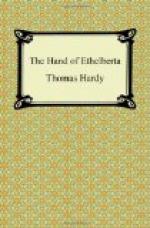‘His address is, Upper Street, Sandbourne.’
‘Thank you, that will do,’ replied her mistress.
The hour grew later, and that dreamy period came round when ladies’ fancies, that have lain shut up close as their fans during the day, begin to assert themselves anew. At this time a good guess at Ethelberta’s thoughts might have been made from her manner of passing the minutes away. Instead of reading, entering notes in her diary, or doing any ordinary thing, she walked to and fro, curled her pretty nether lip within her pretty upper one a great many times, made a cradle of her locked fingers, and paused with fixed eyes where the walls of the room set limits upon her walk to look at nothing but a picture within her mind.
2. Christopher’s house—Sandbourne town—Sandbourne moor
During the wet autumn of the same year, the postman passed one morning as usual into a plain street that ran through the less fashionable portion of Sandbourne, a modern coast town and watering-place not many miles from the ancient Anglebury. He knocked at the door of a flat-faced brick house, and it was opened by a slight, thoughtful young man, with his hat on, just then coming out. The postman put into his hands a book packet, addressed, ‘Christopher Julian, Esq.’
Christopher took the package upstairs, opened it with curiosity, and discovered within a green volume of poems, by an anonymous writer, the title-page bearing the inscription, ‘Metres by E.’ The book was new, though it was cut, and it appeared to have been looked into. The young man, after turning it over and wondering where it came from, laid it on the table and went his way, being in haste to fulfil his engagements for the day.
In the evening, on returning home from his occupations, he sat himself down cosily to read the newly-arrived volume. The winds of this uncertain season were snarling in the chimneys, and drops of rain spat themselves into the fire, revealing plainly that the young man’s room was not far enough from the top of the house to admit of a twist in the flue, and revealing darkly a little more, if that social rule-of-three inverse, the higher in lodgings the lower in pocket, were applicable here. However, the aspect of the room, though homely, was cheerful, a somewhat contradictory group of furniture suggesting that the collection consisted of waifs and strays from a former home, the grimy faces of the old articles exercising a curious and subduing effect on the bright faces of the new. An oval mirror of rococo workmanship, and a heavy cabinet-piano with a cornice like that of an Egyptian temple, adjoined a harmonium of yesterday, and a harp that was almost as new. Printed music of the last century, and manuscript music of the previous evening, lay there in such quantity as to endanger the tidiness of a retreat which was indeed only saved from a chronic state of litter by a pair of hands that sometimes played, with the lightness of breezes, about the sewing-machine standing in a remote corner—if any corner could be called remote in a room so small.




